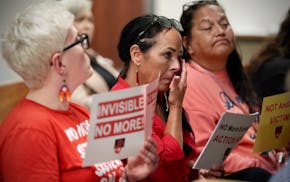State agencies are starting to warn workers they could be laid off in the coming weeks if Minnesota lawmakers remain deadlocked over the budget.
Lawmakers on Monday entered the third week since they adjourned without a two-year budget. Legislative leaders told reporters Monday they could be ready for a special legislative session within a few days, depending on when non-partisan staffers finish writing bills.
"We want Wednesday," said House Democratic Leader Melissa Hortman, of Brooklyn Park. "We want the revisors to draft, draft, draft."
House Speaker Lisa Demuth, R-Cold Spring, agreed that Wednesday is the target.
If lawmakers don't pass a budget by the end of the month, state government would enter a partial shutdown July 1.
Under contracts with unions that represent public employees, the state is required to warn weeks in advance that layoffs may be coming. Nurses received the first of those warnings on Friday. If Minnesota lawmakers still can't reach a budget deal by June 9, layoff notices will go out to the rest of the state workforce, Gov. Tim Walz said last week.
"There's so much uncertainty right now, we don't want to add any more to that," Walz said.
Hortman said last Thursday she was "very confident that there will be a budget in place very soon."
"We are working to make sure that as they are receiving those [layoff] notices," she said, "that they can point a date on the calendar when the special session will happen and that they can also ... point to bills that have been posted that will fund all these agencies so that we can do our best to minimize stress that they shouldn't have to be going through right now."
The Minnesota Nurses Association said in a statement that the layoff notices issued Friday "arrive amid ongoing upheaval for nurses and other public employees," citing federal cuts to health funding and the state's mandate that public employees return to the office.
Closed-door dealmaking criticized
Legislators kept meeting over the weekend in working groups to negotiate contentious elements of the budget, including the two largest line items — health and education.
On Monday, a working group negotiating the education budget met in public for the second time to go over the agreement members struck in closed-door negotiations over the past few weeks. The budget they agreed to doesn't change education spending over the next few years but cuts $420 million in the 2028 and 2029 fiscal years.
Sen. Mary Kunesh, DFL-New Brighton, who chairs the Senate Education Finance Committee, said the negotiations were collegial and required compromises by both Republicans and Democrats.
Over half a dozen offers went back and forth before lawmakers reached a final deal.
"It's not the bill I would have liked to have put forward," Kunesh said, "but I really do think that, given the budget that we were given, we did a good job of getting those dollars to the students in the best way possible."
Rep. Ron Kresha, R-Little Falls, criticized the behind-the-scenes dealmaking that went into striking an education deal, saying "we have to do better about our transparency."
"It is not our job to not finish up on [May 19] and then go into these behind-the-door tribunal meetings," Kresha said.
When lawmakers don't finish on time, Kresha said, they give the governor more leverage in budget negotiations.
Significantly, the education bill would establish a blue ribbon commission to recommend ways to save $250 million in special education spending in the coming years rather than making cuts now.
Bonding still in limbo
Lawmakers have not reached consensus over a bonding package for roads, bridges and other essential construction projects.
Hortman claimed last week that Senate Minority Leader Mark Johnson, R-East Grand Forks, was foiling efforts to reach a bonding deal by making unrelated demands in exchange for support for bonding, which requires a supermajority to pass.
Asked Monday the status of the bonding bill, Hortman said "it's a mystery."
Johnson said in a statement that Democrats were holding up bonding and "playing political blame games to appease their activist base."

'Red alert': Researchers say Minneapolis is failing in response to domestic violence calls

After barrage of gunfire, neighbors, city officials take critical look at Boom Island Park safety

Bushel Boy, Minnesota's local tomato grower, sold
Federal agents surround south Minneapolis restaurant, clashing with protesters

